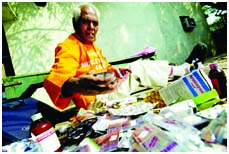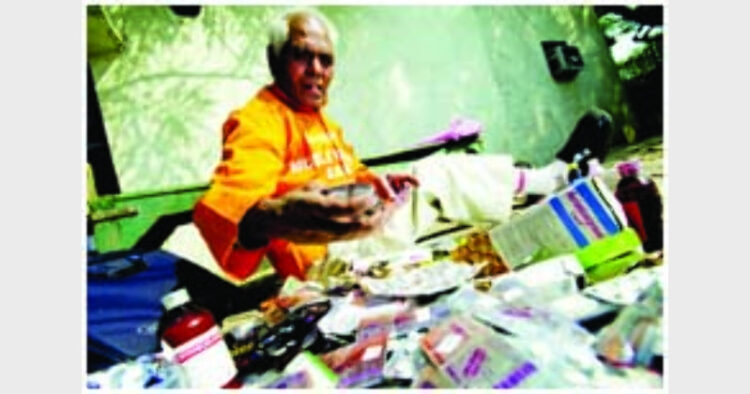 India is the 4th largest producer of medicines in the world and exports to over 200 countries. But this is also a fact that about 900 million Indians do not have access to essential medicines. There are people who cannot even afford simple painkiller tablets. At the same time unused medicines worth millions of rupees get wasted in our homes. 76 year old Shri Omkarnath Sharma has found a remedy to both these problems. He collects medicines from such families before their dates get expired and ensures their supply to needy people. So far he has saved the lives of thousands of people in Delhi.
India is the 4th largest producer of medicines in the world and exports to over 200 countries. But this is also a fact that about 900 million Indians do not have access to essential medicines. There are people who cannot even afford simple painkiller tablets. At the same time unused medicines worth millions of rupees get wasted in our homes. 76 year old Shri Omkarnath Sharma has found a remedy to both these problems. He collects medicines from such families before their dates get expired and ensures their supply to needy people. So far he has saved the lives of thousands of people in Delhi.
Pramod Kumar
Lakhs of people die in the country every year due to lack of medicines. Infact, the number of people who suffer from different diseases without medicines is in crores. But this is only one side of the picture. There are large number of people even in middle class families who throw medicines worth thousands of rupees into dustbin after their purpose is solved even before their expiry date. It could be true to your family also. But have you ever thought that the medicines, which you throw away can save the lives of many people. Yes they can. To know how, meet 76 year old Shri Omkarnath Sharma of Delhi, who is affectionately called as ‘Medicine Baba’ in majority of localities of Delhi.
Omkarnath collects medicines worth Rs about ten lakh in a year and supplies them free of cost to even the leading hospitals like All India Institute of Medical Sciences, Deendayal Upadhyaya Hospital, Ram Manohar Lohia Hospital, Lady Harding Hospital, Rajiv Gandhi Cancer Institute, etc. He also distributes them to a number of dispensaries run by different religious, sewa organisations, temple committees or Gurudwaras.
Since you are not a qualified doctor, how can you give medicines to the patients directly, was my first question to him. Without getting irritated, he replied: “Yes, I am certainly not a doctor. In the beginning, I did gave medicines to some patients, but only after checking the prescriptions of doctors. I on my own never prescribed medicines to anyone. Since I have worked as a lab technician in a hospital of Noida, I have some knowledge of medicines. But now I give all the medicines that I collect to only the doctors or sewa organistions, which distribute them to the needy patients.”
Crippled at the age of 10 due to car accident, the 76 year-old ‘young man’ walks with limp. Despite that, he travels daily by bus using senior citizen’s DTC bus pass and on foot from one slum to another and from one bungalow to another collecting everything from painkillers to multi-vitamins. Often he is snubbed when he shouts for free medicines outside houses. “But I don’t mind. If you’re on the street to beg, you should leave shame at home. Besides, I’m not asking for bread; all I want is unused medicine,” he says. He has built up a pool of regular contributors in neighbourhoods like Green Park. He calls them regularly for medicines.
But there are complications while dealing with medicines at every step. Apart from the legal and professional problems, there are complications in storing them too, as injections need to be stored in refrigerator. “In the beginning I took the help of some doctors, but now I can do it on my own. My weekends are for sorting and record-keeping and Mondays to Thursdays for ‘begging’. I have purchased a magnifying glass to read the medicine labels. I have also taken a room on rent for Rs 2,000 per month—plus electricity—for the medicine cabinets. A kind hearted man has donated a fridge for storing injections,” he said.
Omkarnath’s initiative is striking, given his own history of crises. Without any income or savings, the father of two had to wash dishes in hotels, stay on railway platforms and support his 41-year-old mentally impaired son.
An accident of 2008 changed the objective of his life. When the under construction Metro Rail bridge collapsed in Laxmi Nagar on October 19, 2008, some people were killed while many injured. “I was returning from Noida when I knew about the accident. I rushed to the GTB Hospital where the injured were being taken. What I saw there that majority of the injured were returned simply after administering basic first aid. Even those who were critically injured were told by the doctors to first bring medicines from the market as they did not have medicines in their stock. That incident disturbed me to the extent that I decided to work for providing medicines to the needy people. An idea clicked in my mind “Why not collect unused medicines from families?” Since that day, I did not turn back and will continue to do it till I am alive.
Shri Nath conducted many experiments during these six years. On the advise of some well wishers, he formed an NGO Raahat hi Raahat. But I find the work more convenient while working under the banner of Mobile Medicine Bank. His saffron shirt, on which his contact numbers (9250243298 and 9971926518) are printed, has made him a familiar face in the campuse of Janaki Devi Memorial College in West Delhi, which supports his mission. His work has moved some people to the extent that they are willing to help him. Dr Mamata Bhushan Singh, Professor of Neurology in AIIMS, regularly calls him offering every possible help. Shri Omkarnath has kept some boxes at Janaki Devi College, Ahimsa Bhavan (Rajinder Nagar), Arya Samaj Mandir (Rajinder Nagar), Sat Manjila Mandir (Tilak Nagar), Ahimsa Vihar Apartment (Sector 9, Rohini) and Sunrise Apartment (Sector 13, Rohini) for collecting medicines.
Apart from donating unused medicines from home, some people have now offered to give medicines after purchasing from market. Impressed over this idea, some students of Jamia Millia University and also from IIT Delhi are regularly helping him in this cause. He has also been invited by some universities for sharing his idea with the students.
It is an irony that some people die without medicines, while some die due to overdoses prescribed by majority of private doctors. According to reports, 50 to 80 per cent of Indian population is not able to access all the medicines that they need. The World Medicine Report (2004) of the World Health Organisation finds that India is one of the countries with largest number of people without having access to essential medicines. In this scenario, the initative taken by Shri Omkarnath Sharma can save the lives of many.














Comments